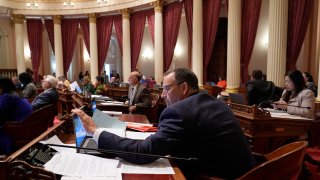
California lawmakers are working through hundreds of bills before the legislative session ends on Thursday.
If approved, the bills go to Democratic Gov. Gavin Newsom, who will have until Oct. 14 to decide whether to sign them into law, veto them or let them become law without his signature.
The state Legislature almost never overrides a veto from the governor, no matter what political party is in charge.
Chemicals in food
Get Southern California news, weather forecasts and entertainment stories to your inbox. Sign up for NBC LA newsletters.
Lawmakers on Tuesday voted to become the first state to ban four chemicals from processed food and drinks sold in California by 2027.
The chemicals — red dye no. 3, potassium bromate, brominated vegetable oil and propyl paraben — are still used in popular products like Peeps, the popular marshmallow chicks most associated with Easter.
Democratic Assemblymember Jesse Gabriel, the author of the bill, said those chemicals have already been banned by the European Union and other countries because of scientific research linking them to health problems, including cancer.
Local
Get Los Angeles's latest local news on crime, entertainment, weather, schools, COVID, cost of living and more. Here's your go-to source for today's LA news.
“It is unacceptable that the U.S. is so far behind the rest of the world when it comes to food safety,” Gabriel said. “This bill will not ban any foods or products — it simply will require food companies to make minor modifications to their recipes.”
An earlier version of the bill would also have banned titanium dioxide, which is used in Skittles. But amendments in the state Senate removed that chemical from the ban.
Disclosing financial risks of climate change
The state Assembly approved a bill requiring companies making more than $500 million annually to disclose what financial risks climate change poses to their businesses and how they plan to address those risks.
State Sen. Henry Stern, a Democrat from Los Angeles who introduced the legislation, said the information would be useful for individuals and lawmakers when making public and private investment decisions. The bill was changed recently to require companies to begin reporting the information in 2026, instead of 2024, and mandate that they report every other year, instead of annually.
The changes would help make it more feasible for businesses to follow through with reporting requirements, said Anne DiGrazia, a spokesperson for Stern.
The bill was among the biggest climate proposals in the state Legislature this year, collecting support from major companies including IKEA and Microsoft, as well as former California Air Resources Board Chair Mary D. Nichols.
Opponents of the bill say it would be too burdensome for companies and is premature. The U.S. Securities and Exchange Commission could approve rules requiring public companies to disclose their direct and indirect emissions, as well as how climate risk affects their business.
The proposed California mandate would apply to more than 10,000 companies, according to Ceres, a policy group supporting it. The vote comes after the state Legislature sent another bill to Newsom that would require companies making more than $1 billion annually to report their direct and indirect greenhouse gas emissions.
Climate change school curriculum
The Senate passed a bill that would require schools to teach students, from first grade through high school, about the causes and effects of climate change. The bill also would mandate lessons on how to mitigate and adapt to the effects of the changing climate.
Proponents of the bill say lessons about climate change are already a part of school curricula in other countries including Italy and New Zealand. Oregon also introduced legislation this year to mandate climate change lessons, but the bill did not advance.
It would still need final approval in the Assembly before ending up on Newsom’s desk.
Cannabis cafes
The Legislature sent a bill to Newsom’s desk that could create more so-called “cannabis cafes,” inspired by establishments in Amsterdam where customers can socialize and purchase cannabis, coffee and other products.
The bill would allow local governments to give licenses to cannabis dispensaries to sell non-cannabis food, beverages and tickets to live music events.
Democratic Assemblymember Matt Haney of San Francisco, who introduced the bill, said it would give a boost to small cannabis businesses. He said many people want to be able to socialize and listen to live music while consuming cannabis.
“There’s absolutely no good reason from an economic, health or safety standpoint that the state should make that illegal,” Haney said in a statement.



